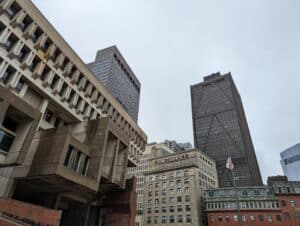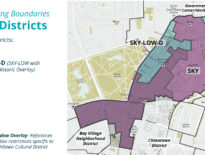
Boston City Hall and downtown Boston office buildings seen from City Hall Plaza. Photo by James Sanna | Banker & Tradesman Staff / file
Only days after announcing a plan to seek state approval to raise property tax rates on commercial property owners, Boston Mayor Michelle Wu filed a $4.6 billion budget plan for 2025 that would hike city spending by 8 percent, or $344 million.
The optics don’t look good, and the situation has some asking whether the city should be looking for ways to rein in spending if it’s going to ask more of commercial building owners already struggling under the weight of vacancy rates above 20 percent.
The taxing questions have been set in motion by the pandemic’s upending of work patterns.
With hybrid schedules now becoming a permanent part of many workplaces, office vacancy rates have remained high. Some downtown Boston office buildings have sold recently for deep discounts over what owners paid for them. That has led to projections that assessed values of buildings could drop sharply, something that would lower corresponding tax payments from those properties.
Boston taxes commercial property at a much higher rate than residential property, but it’s already doing so at the highest rate allowed by state law. That’s why Wu wants the state to allow the city to impose a temporary increase in commercial rates if assessed values do fall. Without it, the city says, residents would be hit with a huge spike in their tax rates to keep the city budget funded.
Wu insists that any increase in commercial rates won’t actually mean higher tax payments for owners of troubled buildings. For those who see a drop in assessed values, she said, the result would just mean less of a decrease in taxes than they would otherwise experience.
“If you ask me to choose between every single resident and homeowner having to have double-digit increases in their taxes or our commercial property owners, who definitely are struggling, paying a little bit less of a decrease in taxes, I’m going to choose that every time,” she said Tuesday in her monthly appearance on GBH radio.
That’s proving to be small comfort to a sector that’s been battered by the pandemic.
“This is essentially being viewed as kicking them when they’re down,” said Tamara Small, chief executive of the NAIOP Massachusetts, which represents commercial property owners. “This is really just going to exacerbate the value loss property owners are seeing.”
Wu is pointing to a similar move two decades ago by then-Mayor Tom Menino, who won state approval for a temporary increase in commercial rates to cushion the effects of the dot-com bust and a big drop in state aid.
But that also came with a city effort to restrain spending, including a decrease of more than 1,200 positions, or 7.5 percent of the city workforce. “There was more of a belt-tightening on the city side, preparing for a change in revenues,” said Elaine Beattie of the Boston Municipal Research Bureau, who has been at the business-funded watchdog group since the mid-1980s.
Marty Walz, the research bureau’s interim president, said the city should be again looking at spending as it contemplates seeking an increase in commercial tax rates. “The research bureau has called for a comprehensive and balanced approach to the likely decline in commercial tax revenue,” she said in a statement. “As a result, it is disappointing to see a proposed budget that doesn’t include spending reductions to ameliorate the impact of the mayor’s proposal to increase property taxes.”
Wu said the city is struggling just to maintain its current level of services amid costs that keep increasing. “Our belts are already very tight,” she said in a brief interview on Tuesday. “If you ask any of our city departments what they need to get the job done, they already don’t have enough and are going above and beyond.”
She also pointed out that about quarter of the proposed 8 percent budget increase in her spending plan simply reflects a shift of personnel and spending from the quasi-public Boston Planning and Development Agency onto the city budget under a new ordinance that has the BPDA operate as a regular city department.
Jim Rooney, chief executive of the Greater Boston Chamber of Commerce, said there are fears that raising tax rates on office buildings could create “a downward spiral in the commercial real estate market.” At the same time, he said, for Boston mayors, hiking residential taxes has always been for “a political third rail that they don’t want to touch.”
Just as state government is now doing, Rooney said the city has to address the reality of fiscal headwinds as part of its response. “The rate of spending at the city and state level has to be part of the conversation,” he said.
Property taxes fund nearly three-quarters of Boston’s budget, one of the highest shares of any major US city. Small, the commercial property association leader, said the city should work to diversify its sources of revenue.
But the state has been notoriously resistant to giving Boston the kind of leeway other US cities have to raise revenue through other mechanisms, like local income or sales taxes. Without a change in that disposition from Beacon Hill, there’s no getting around the showdown over property taxes and who pays what share of them.
This article first appeared on CommonWealth Beacon and is republished here under a Creative Commons license.![]()






